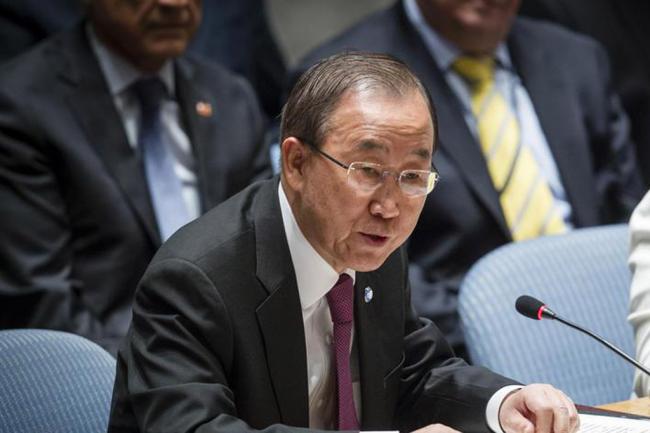
UN must boost links among development, security, human rights, Ban tells Security Council
“The founders of the United Nations well understood that if we ignore one pillar, we imperil the other two,” said Ban during today’s Security Council debate on inclusive development for the maintenance of international peace and security, which was chaired by Michelle Bachelet, President of Chile, which holds the 15-member body’s presidency for the month.
“The post-2015 sustainable development agenda is an important opportunity to reinforce the interdependence of development, peace and security, and human rights,” he told the Council debate, which coincides with the opening of the General Assembly’s three-day informal ‘stock-taking’ in the process of intergovernmental negotiations on that future agenda.
The Secretary-General said he was encouraged that during debates so far held about completing the Millennium Development Goals (MDGs) by the end of this year, launching a post-2015 sustainability agenda, and reaching an agreement on climate change, Member States had paid considerable attention to peace and security and to human rights.
The General Assembly Open Working Group on Sustainable Development Goals had discussed the importance of inclusive growth and decent work, called for reducing inequality and ensuring universal access to basic services, including health care and education, had explicitly linked peace with social inclusion and access to justice for all, and had called for inclusive, representative decision-making.
In the so called ‘synthesis’ report he presented to the General Assembly last month – The Road to Dignity by 2030: Ending Poverty, Transforming All Lives and Protecting the Planet ¬– Ban underscored the importance of justice to building peaceful and inclusive societies, emphasising the need for strong and responsive institutions.
“With the full membership of the United Nations beginning its negotiations later this morning, we now have an important opportunity to broaden the development agenda and highlight the fundamental importance of inclusive societies in building a more peaceful world,” he said.
Every country could benefit from sustainable and inclusive development, tackling persistent exclusion and inequality, ensuring that the most vulnerable have access to basic services and can participate in political dialogue, tackling the “blatant injustice” of discrimination against women and girls, and extending social security provision to the world’s population still lacking a safety net for times of illness or unemployment.
Post-conflict societies in particular need to prioritize social, economic and political inclusion in order to rebuild trust between communities. Women’s participation in reconciliation and reconstruction also depended on gender equality and women’s empowerment, he said.
“The Peacebuilding Commission provides coordinated international support targeted at countries emerging from conflict,” continued Ban. “The current review of the UN’s peacebuilding architecture should help to make that support more robust and flexible.”
Even in countries at peace, governments, the private sector and civil society must demonstrate commitment to inclusive development in education, health and job creation. It is also necessary to strengthen institutions of governance and political representation as they were some of the most crucial determinants of inclusive development.
“People need effective, responsive channels for voicing their views and addressing their grievances and concerns,” he said.
During the meeting, Security Council members adopted a Presidential Statement reaffirming the body’s commitment to sustainable peace and underlining the close linking and mutually reinforcing relationship between security and development, and the importance of that relationship to sustainable peace.
Supporting countries in efforts to emerge from conflict requires a comprehensive and integrated approach, Council members reaffirmed in the Statement, adding that such an approach should incorporate and strengthen coherence between political, security, development, human rights and rule of law activities, and addressed the root causes of each conflict.
The Council also reaffirmed the importance of national ownership and national responsibility to establishing sustainable peace, and underlined the need for coordination of integrated action on the ground by security and development actors with national authorities.
Also included in the Statement was the Council’s encouragement to Member States to develop a UN common approach to inclusive development as a key for preventing conflict and enabling long-term stability and sustainable peace. In that regard, identifying and addressing exclusion, intolerance and violent extremism were important.
The Council also recognized the continuing need to increase women’s participation and the consideration of gender-related issues in all discussions, and called upon Member States to take concrete measures to further assist youth.
UN Photo/Louiesen Felipe
Support Our Journalism
We cannot do without you.. your contribution supports unbiased journalism
IBNS is not driven by any ism- not wokeism, not racism, not skewed secularism, not hyper right-wing or left liberal ideals, nor by any hardline religious beliefs or hyper nationalism. We want to serve you good old objective news, as they are. We do not judge or preach. We let people decide for themselves. We only try to present factual and well-sourced news.







